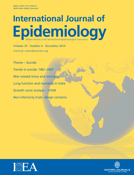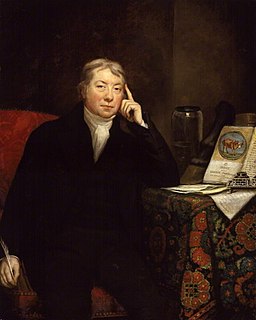Related Research Articles

Epidemiology is the study and analysis of the distribution, patterns and determinants of health and disease conditions in defined population.
The science of epidemiology has matured significantly from the times of Hippocrates, Semmelweis and John Snow. The techniques for gathering and analyzing epidemiological data vary depending on the type of disease being monitored but each study will have overarching similarities.
Psychiatric epidemiology is a field which studies the causes (etiology) of mental disorders in society, as well as conceptualization and prevalence of mental illness. It is a subfield of the more general epidemiology. It has roots in sociological studies of the early 20th century. However, while sociological exposures are still widely studied in psychiatric epidemiology, the field has since expanded to the study of a wide area of environmental risk factors, such as major life events, as well as genetic exposures. Increasingly neuroscientific techniques like MRI are used to explore the mechanisms behind how exposures to risk factors may impact psychological problems and explore the neuroanatomical substrate underlying psychiatric disorders.
Molecular epidemiology is a branch of epidemiology and medical science that focuses on the contribution of potential genetic and environmental risk factors, identified at the molecular level, to the etiology, distribution and prevention of disease within families and across populations. This field has emerged from the integration of molecular biology into traditional epidemiological research. Molecular epidemiology improves our understanding of the pathogenesis of disease by identifying specific pathways, molecules and genes that influence the risk of developing disease. More broadly, it seeks to establish understanding of how the interactions between genetic traits and environmental exposures result in disease.

Sander Greenland is an American statistician and epidemiologist with many contributions to statistical and epidemiologic methods including Bayesian and causal inference, bias analysis, and meta-analysis. His focus has been the extensions, limitations, and misuses of statistical methods in nonexperimental studies, especially in postmarketing surveillance of drugs, vaccines, and medical devices. He received honors Bachelor's and Master's degrees in Mathematics from the University of California, Berkeley, where he was Regent's and National Science Foundation Fellow in Mathematics, and then received Master's and Doctoral degrees in Epidemiology from the University of California, Los Angeles (UCLA), where he was Regent's Fellow in Epidemiology. After serving as an Assistant Professor of Biostatistics at Harvard, he joined the UCLA Epidemiology faculty in 1980 where he became Professor of Epidemiology in the Fielding School of Public Health in 1989, and Professor of Statistics in the UCLA College of Letters and Science in 1999. He moved to Emeritus status in 2012 and the following year he was awarded an honorary Doctor of Medicine by the University of Aarhus, Denmark.
Genetic epidemiology is the study of the role of genetic factors in determining health and disease in families and in populations, and the interplay of such genetic factors with environmental factors. Genetic epidemiology seeks to derive a statistical and quantitative analysis of how genetics work in large groups.
The American Journal of Epidemiology (AJE) is a peer-reviewed journal for empirical research findings, opinion pieces, and methodological developments in the field of epidemiological research. The current editor-in-chief is Dr. Enrique Schisterman.

The International Journal of Epidemiology is a bimonthly peer-reviewed medical journal covering research in epidemiology. It is the official journal of the International Epidemiological Association and is published by Oxford University Press. The journal is a member of the Committee on Publication Ethics. The editor-in-chief is Stephen Leeder.
Miquel Porta is a Catalan physician, epidemiologist and scholar. He has promoted the integration of biological, clinical and environmental knowledge and methods in health research and teaching, which he has conducted internationally; notably, in Spain, at the University of North Carolina at Chapel Hill, Harvard, Imperial College London, and several other universities in Europe, North America, Kuwait, and Brazil. Appointed by the International Epidemiological Association (IEA), in 2008 he succeeded the Canadian epidemiologist John M. Last as Editor of "A Dictionary of Epidemiology". In the Preface to this book he argues for an inclusive and integrative practice of the science of epidemiology.
The Bradford Hill criteria, otherwise known as Hill's criteria for causation, are a group of nine principles that can be useful in establishing epidemiologic evidence of a causal relationship between a presumed cause and an observed effect and have been widely used in public health research. They were established in 1965 by the English epidemiologist Sir Austin Bradford Hill.
Basic research, also called pure research or fundamental research, is a type of scientific research with the aim of improving scientific theories for better understanding and prediction of natural or other phenomena. In contrast, applied research uses scientific theories to develop technology or techniques which can be used to intervene and alter natural or other phenomena. Though often driven simply by curiosity, basic research often fuels the technological innovations of applied science. The two aims are often practiced simultaneously in coordinated research and development.
Cause, also known as etiology and aetiology, is the reason or origination of something.
The epidemiology of depression has been studied across the world. Depression is a major cause of morbidity worldwide, as the epidemiology has shown. Lifetime prevalence estimates vary widely, from 3% in Japan to 17% in India. Epidemiological data shows higher rates of depression in the Middle East, North Africa, South Asia and U.S.A than in other countries. Among the 10 countries studied, the number of people who would experience depression during their lives falls within an 8–12% range in most of them.

John Francis Kurtzke was a neuroepidemiologist and Professor of Neurology at Georgetown University who is best known for his creation of the Expanded Disability Status Scale and for his research on multiple sclerosis (MS). After graduating from Cornell University Medical College in 1952, Dr. Kurtzke started his career in the field of Neurology as Chief of the Neurology Service at the Veteran’s Affairs (VA) Medical Centers in Coatesville, Pennsylvania, from 1956 to 1963, and then in Washington, DC, from 1963 to 1995, where he became Professor of Neurology at Georgetown University. At the time of his death, he held the title of Professor Emeritus at Georgetown University.
Molecular pathological epidemiology is a discipline combining epidemiology and pathology. It is defined as "epidemiology of molecular pathology and heterogeneity of disease". Pathology and epidemiology share the same goal of elucidating etiology of disease, and MPE aims to achieve this goal at molecular, individual and population levels. Typically, MPE utilizes tissue pathology resources and data within existing epidemiology studies. Molecular epidemiology broadly encompasses MPE and conventional-type molecular epidemiology with the use of traditional disease designation systems.

The Edward Jenner Medal is awarded occasionally by the Royal Society of Medicine to individuals who have undertaken distinguished work in epidemiological research.
Abraham Morris Lilienfeld was an American epidemiologist and professor at the Johns Hopkins School of Hygiene and Public Health. He is known for his work in expanding epidemiology to focus on chronic diseases as well as infectious ones.
Ralph R. Frerichs is Professor Emeritus of Epidemiology at UCLA where he was active as a full-time faculty member in the School of Public Health for 31 years and as the Epidemiology department chair for 13 years, before retiring in late 2008. Both at UCLA and in international workshops he taught epidemiologic methods, the use of rapid community-based surveys, epidemiologic simulation models for focused research, and screening and surveillance methods for HIV/AIDS and other diseases.
The Society for Epidemiologic Research is a learned society dedicated to epidemiology. It was originally proposed in 1967 by Abraham Lilienfeld, Milton Terris, and Brian MacMahon, and was founded the following year. Their motivation in founding SER was to provide an annual meeting where junior faculty in epidemiology departments and graduate students could present their ongoing research to senior epidemiologists and receive criticism, comments, and encouragement. An additional goal was to promote the exchange of ideas between epidemiologists and statisticians.

Elizabeth Louise Barrett-Connor was Chief of the Division of Epidemiology and Distinguished Professor at the University of California, San Diego. She investigated the role of hormones in pathogenesis of cardiovascular disease, diabetes and osteoporosis.
References
- ↑ Paul, O (1 July 1998). "The last twenty-five years of the American Epidemiological Society: 1972-1996". American Journal of Epidemiology. 148 (1): 104–30. doi: 10.1093/oxfordjournals.aje.a009550 . PMID 9663413.
- ↑ McKeown, RE; Weed, DL; Kahn, JP; Stoto, MA (April 2003). "American College of Epidemiology Ethics Guidelines: foundations and dissemination" (PDF). Science and Engineering Ethics. 9 (2): 207–14. doi:10.1007/s11948-003-0008-y. PMID 12774653. Archived from the original (PDF) on 2016-03-05. Retrieved 2016-02-28.
- ↑ "Kenrad Nelson '54 Elected President of American Epidemiological Society". DePauw University. 29 June 2006. Retrieved 27 February 2016.